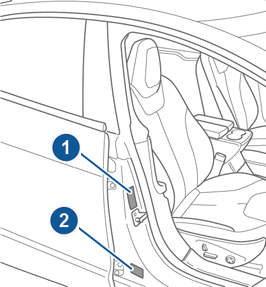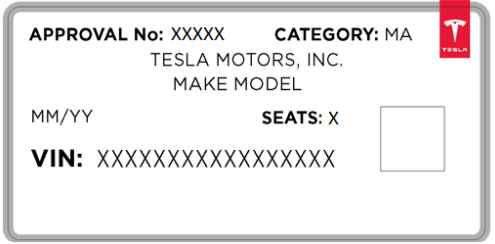Vehicle Loading
Vehicle Labeling
It is important to understand your vehicle's original tire sizes and pressures, and theTPMLM (Technically Permissible Maximum Label Mass) and TPMAM (Technically Permissible Maximum Mass on Axle). This information can be found on two labels attached to Model S.

- Tire Information Label
- Identification Plate
Warning
Overloading Model S has an adverse effect on braking and handling, which can compromise your safety or cause damage.
CAUTION
Never store large amounts of liquid in Model S. A significant spill can cause electrical components to malfunction.
Tire Information Label
The Tire Information label provides:
- The maximum number of occupant seating positions.
- The size of the original tires.
- The cold inflation pressures for the original front and rear tires. These pressures are recommended to optimize ride and handling characteristics.
Label Format:

Never change this label, even if you use different tires in the future.
Note
If Model S is loaded to its full capacity, double check all tires to ensure they are inflated to their recommended pressure levels.
Identification Plate
Towing a Trailer
Warning
Do not use Model S for towing purposes. Model S does not support a trailer hitch. Installing one could cause damage and increase the risk of a collision.
CAUTION
Using Model S for towing may void the warranty.
Roof Racks
A Model S equipped with a glass roof, or a panoramic sunroof, can carry up to 165 lbs (75 kg) using a Tesla-approved roof rack (see Parts and Accessories).A Model S equipped with a solid body color roof is incompatible with roof racks.
CAUTION
Do not use roof racks, or place any load, on the roof of a Model S that is equipped with a solid color roof. Doing so can cause significant damage.
